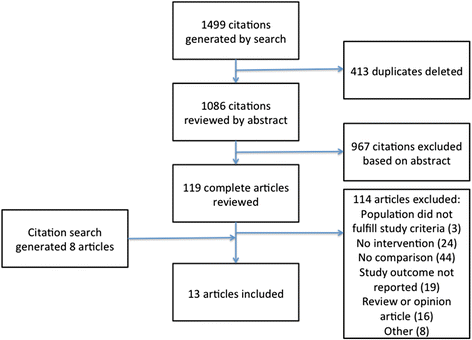A systematic review of community based hepatitis C treatment
- PMID: 27184661
- PMCID: PMC4867528
- DOI: 10.1186/s12879-016-1548-5
A systematic review of community based hepatitis C treatment
Abstract
Background: Hepatitis C virus (HCV) treatment uptake globally is low. A barrier to treatment is the necessity to attend specialists, usually in a tertiary hospital. We investigate the literature to assess the effect of providing HCV treatment in the community on treatment uptake and cure.
Methods: Three databases were searched for studies that contained a comparison between HCV treatment uptake or sustained virologic response (SVR) in a community site and a tertiary site. Treatment was with standard interferon with or without ribavirin, or pegylated interferon and ribavirin. A narrative synthesis was conducted.
Results: Thirteen studies fulfilled the inclusion criteria. Six studies measured treatment uptake; three demonstrated an increase in uptake at the community site, two demonstrated similar rates between sites and one demonstrated decreased uptake at the community site. Nine studies measured SVR; four demonstrated higher SVR rates in the community, four demonstrated similar SVR rates, and one demonstrated inferior SVR rates in the community compared to the tertiary site.
Conclusion: The data available supports the efficacy of HCV treatment in the community, and the potential for community based treatment to increase treatment uptake. Whilst further studies are required, these findings highlight the potential benefit of providing community based HCV care - benefits that should be realised as interferon-free therapy become available. (PROSPERO registration number CRD42015025505).
Keywords: Community-based; Hepatitis C; Models of care; Opioid substitution; Treatment.
References
-
- Crespo J, Cabezas J, Sacristan B, Olcoz JL, Perez R, De la Vega J, Garcia R, Garcia-Pajares F, Saez-Royuela F, Gonzalez JM, et al. Barriers to HCV treatment in the era of triple therapy: a prospective multi-centred study in clinical practice. Liver Int. 2015;35(2):401–8. doi: 10.1111/liv.12536. - DOI - PubMed
Publication types
MeSH terms
Substances
LinkOut - more resources
Full Text Sources
Other Literature Sources
Medical


